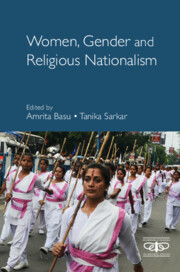Book contents
- Frontmatter
- Dedication
- Contents
- List of Abbreviations
- Introduction: Women of Hindu Rashtra
- Part I Changing Modalities of Hindu Nationalist Organizing
- Part II Gendered Techniques of Mobilization: The Sangh and the Samiti
- Part III Cultivating Women’s Militancy: The Vishva Hindu Parishad
- Part IV Refashioning Gender and Sexuality
- Part V Alternative Activist Responses to the Hindu Right
- Glossary
- About the Contributors
- Index
8 - Trans Contestations in an Era of Heightened Nationalism: The Saffronization of Transgender Identity
Published online by Cambridge University Press: 12 August 2022
- Frontmatter
- Dedication
- Contents
- List of Abbreviations
- Introduction: Women of Hindu Rashtra
- Part I Changing Modalities of Hindu Nationalist Organizing
- Part II Gendered Techniques of Mobilization: The Sangh and the Samiti
- Part III Cultivating Women’s Militancy: The Vishva Hindu Parishad
- Part IV Refashioning Gender and Sexuality
- Part V Alternative Activist Responses to the Hindu Right
- Glossary
- About the Contributors
- Index
Summary
Introduction
In November 2018, the Kinnar Akhada, a religious order established by members of the kinnar and hijra communities, declared that they supported the demand for the construction of a Ram temple on the site of the destroyed Babri Masjid in Ayodhya. At a meeting organized by the Akhil Bharatiya Sant Samiti, an umbrella body of Hindu monks and ascetics, to which the Kinnar Akhada had been invited, Acharya Mahamandleshwar Laxmi Narayan Tripathi declared, ‘whether anybody is gay, lesbian, transgender, whatever is anybody [sic] sexuality … the biggest thing is the Hindu sanatan dharma [duty]. And the sanatan vedic practice has never questioned anyone's sexuality. Our religion has space for everyone … it takes every one along’ (Verma 2018).
Is there a place in the nation for ‘queer’ communities? LGBT+ groups have gained significant rights in the last decade, with two Supreme Court judgment declaring equal rights and protections for transgender communities and decriminalizing same-sex sexual practices. The right-wing Bharatiya Janata Party (hereafter BJP) has drafted and passed Parliament bills, enshrining in law protections of transgender rights. The Indian state has acted as the paternalistic giver of rights. But it does not consider all LGBT+ citizens equal: transgender communities appear to benefit over LGB ones, trans women over trans men, Hindu trans communities over Muslim ones.
How – and why – might the Hindu right foreground some forms of transgender identity at the expense of others? Considering the Supreme Court judgment on transgender rights, National Legal Services Authority (NALSA) v. Union of India and Others (2014), and Parliament bills subsequent to this judgment, this chapter considers how and why the Hindu right favours Hindu trans (feminine) identities above other less visible, non-homonormative trans identities and Muslim trans people. Although the NALSA judgment was delivered in April 2014, preceding the BJP election in May of the same year, the incoming government was mandated to adopt the judgment's recommendations. The Indian state has treated trans rights as something to be undertaken in a procedural manner rather than an ethical one, with certain trans communities benefitting from unequal representation (notably Hindu, trans feminine identities), demonstrating a lack of care with which the government has attended to this task.
- Type
- Chapter
- Information
- Women, Gender and Religious Nationalism , pp. 224 - 262Publisher: Cambridge University PressPrint publication year: 2022
- 1
- Cited by



